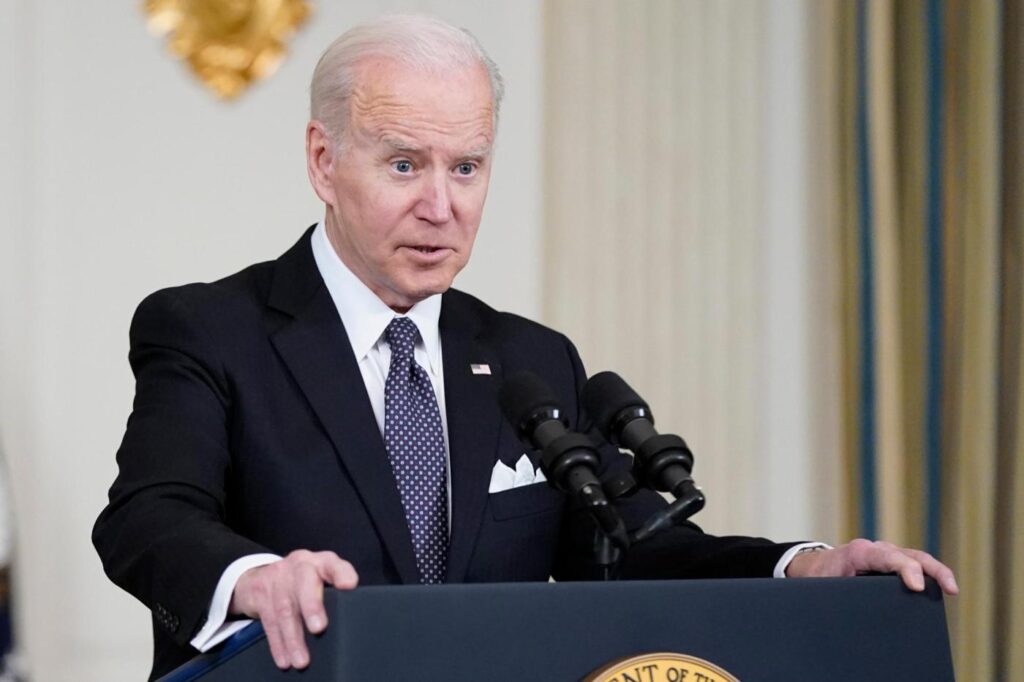
On Saturday, President Joe Biden gave a speech in which he appeared to call for Vladimir Putin’s removal from power – directly contradicting the policy of his own administration, which does not support a regime change.
Rushing to course-correct, the U.S.’s NATO ambassador later insisted that the remarks were “a principled human reaction” to his emotional visit with Ukrainian refugees, and reinforced that the U.S. was not calling for Putin’s ouster.
This was by no means the first verbal blunder that Biden has made during this crisis.
He recently told U.S. troops in Poland that they would witness the bravery of the Ukrainian people “when you’re there” – implying that the U.S. would send soldiers to Ukraine, which would undercut his pledge not to send American troops into non-NATO countries.
Further, in January, Biden erroneously implied that a “minor incursion” by Russia into Ukraine might not trigger Western sanctions – which garnered criticism from America’s allies and from Ukrainian President Volodymyr Zelensky.
In both cases, the White House scrambled to clean up the president’s mess by explaining away the misstep while also reinforcing that America’s position had remained unchanged, despite what Biden had said.
Ultimately, these gaffes are not justifiable mistakes – rather, they are characteristic of the incoherence and inconsistency that President Biden has frequently exhibited during his handling of this global crisis.
While President Biden’s inconsistent approach to foreign policy is entirely different from the erraticism of his immediate predecessor, his indiscipline is just as harmful, especially during times of global conflict.
The American president’s words and actions carry the most weight of any leader. The world is watching, and every time President Biden says something he doesn’t mean or doesn’t follow-through on, America’s credibility suffers, and our undemocratic adversaries feel emboldened.
To be sure, President Biden’s verbal blunders aren’t the only problem with his approach to the war. Often times, his words – namely, his tough-talk against Putin, like calling him a “war criminal,” and his grandstanding about global democracy and the significance of supporting Ukraine – are not met with comparable action.
Indeed, despite Biden’s harsh rhetoric against Putin, his administration is actively and directly undercutting Western efforts to isolate and destabilize Russia by re-entering the Iran Nuclear Deal.
It strains credulity for the Biden Administration to impose debilitating sanctions against Putin vis-à-vis Ukraine, while also entering a deal with Russia that gives Putin an opening to leverage Iran for relief from sanctions imposed by the West.
Notably, Biden has even been called out by Zelensky for his actions not always living up to his words. The Ukrainian president recently criticized the West’s “incomplete” sanctions on Russia, and asserted that Western nations weren’t sending more aid to the Ukrainian military because they were “afraid of Russia.”
An important note: while Zelensky’s criticisms are in many ways valid, Biden does deserve credit for rallying Europe around crushing sanctions against Russia, banning imports of Russian oil, and sending billions of dollars in military aid and weapons to Ukraine.
Further, Biden and Zelensky spoke on Wednesday, and Biden reportedly said that the U.S. intends to provide Ukraine with $500 million in direct budgetary aid, on top of the additional $1 billion in humanitarian aid that the U.S. announced for Ukraine last week.
That being said, though these are important steps, there is much more to be done – not only to save Ukrainian lives, but to demonstrate to Putin and to our other adversaries that the U.S. has a plan of action to counter Russia in a way that is forceful, consistent, and coherent. The time has come for Biden to draw a ‘red-line’ for the Kremlin, making it known to Putin that all options are on the table if he deploys biological, chemical, or nuclear weapons against Ukraine.
If the United States fails to make this clear to Putin – especially when we consider the failures of Biden’s approach as of late – the Ukrainian people will continue to suffer immensely, and powerful rogue states like China will be emboldened by this inaction.
To be sure, Chinese President Xi Jinping likely already feels encouraged by Biden’s recent blunders and inconsistencies, as it signals that the administration’s response would be similarly disjointed if mainland China begins taking more aggressive actions against Taiwan.
Since he took office, President Biden’s ostensibly tough talk against the CCP — for their aggression against Taiwan, their undemocratic actions to quell opposition in Hong Kong, and their human rights abuses — has not been met with comparable action. Thus, if Biden does not course-correct vis-à-vis Russia and Ukraine, Xi will take this as reassurance, and Taiwan will be at risk.
Related Articles
Hollywood face-slaps conservatives: Larry Elder
Never forget the late, great Walter E. Williams
Pete Hardin, Mike Jacobs and Todd Spitzer on Proposition 57
Inflation: the result of sticker shock on government spending
Building a dynamic OC workforce by investing in innovation at CSUF
To that end, if Taiwan feels that the U.S. — the most prominent steadfast supporter of the island’s independence — is an unreliable international partner, Taiwan may be more willing to accept the terms of mainland China’s rule out of fear, which would undermine democracy both there and around the world.
Simply put, the stakes of the war in Ukraine are too high for the inconsistency and incoherence that we’ve seen from the president. Going forward, it is absolutely necessary for Biden to tighten his rhetoric and match his tough talk against Russia with corresponding action.
In both word and deed, Biden must make clear to Russia – and to the rest of the world – that the U.S. will not tolerate rogue dictators like Putin who believe they can destabilize, terrorize, and lay claim to sovereign countries.
The U.S. failed to make this clear to Putin once before, and the Ukrainian people are now suffering immensely because of it.
Douglas Schoen is a longtime political consultant.
